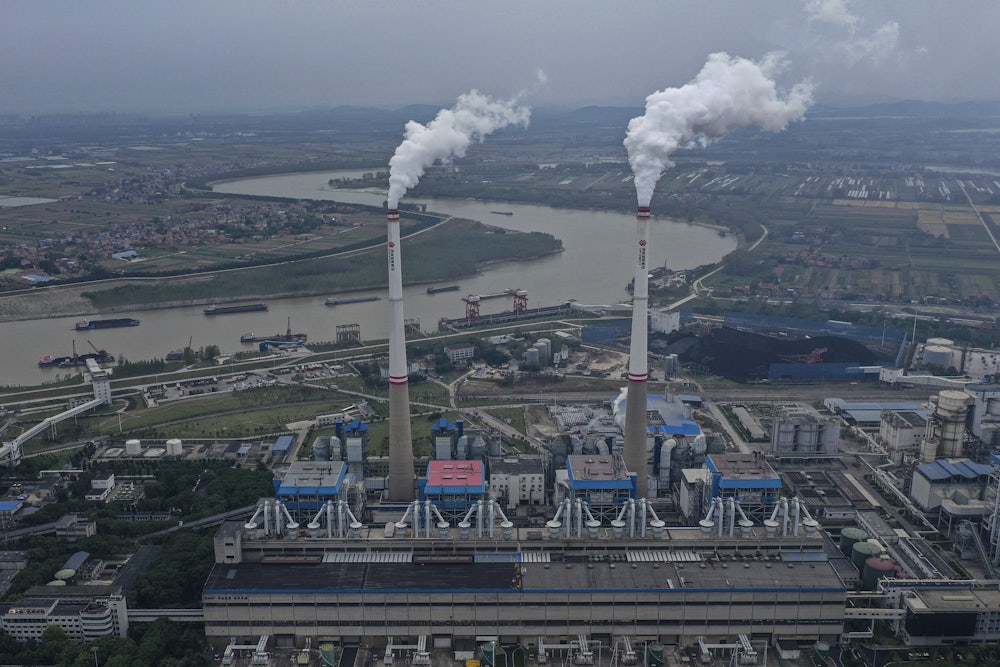World leaders can’t even seem to pick the lowest-hanging fruit of the energy transition. Coal-fired power generation is set to increase this year for the first time since 2014, thanks in large part to higher than average methane gas prices. The U.S. Energy Information Administration does expect coal use to decline by 5 percent next year as retirements continue, but that isn’t nearly fast enough. The United Nations–backed Production Gap Report, released last week by a team led by the Stockholm Environmental Institute, finds that world governments still plan to produce 120 percent more coal than is consistent with keeping warming below two degrees Celsius (3.6 degrees Fahrenheit), and 240 percent more than is consistent with capping warming at 1.5 degrees. By 2040—when as much time will have passed from today as between now and the release of My Big Fat Greek Wedding—governments will have produced 540 percent more coal than is consistent with keeping warming below 1.5 degrees Celsius.
In what may well be a preview for the U.N. climate talks kicking off in Glasgow next week, the world’s wealthiest and most polluting nations are already balking on their earlier rhetoric about getting off coal, opting instead for a more limited goal of ending overseas financing for coal projects, eventually. Last week, Bloomberg reported that preparatory talks for the G20 summit this coming weekend in Rome ended in a stalemate on whether to try to limit warming to two degrees or work toward net-zero. As a reminder, the Paris Agreement—the document world leaders will try to figure out how to implement at the twenty-sixth U.N. Climate Change Conference of the Parties, or COP26, next week—doesn’t mention fossil fuels at all.
The United States has been loath to join a push by Italy and the United Kingdom for coal phaseouts at home and abroad, across the G20. China pledged in September to stop financing coal projects abroad, although the country has ramped up coal-fired power generation in recent months after catastrophic flooding inundated mines in one of the country’s biggest coal-producing regions. With an eye toward Glasgow, China also said this week that it would look to meet 80 percent of domestic energy demand with non–fossil fueled sources by 2060.
There is no historical precedent for the rate at which coal, oil, and gas need to decline to meet the 1.5 degree target set out by the Paris Agreement, according to an analysis published in the journal One Earth of fossil fuel use declines in 105 countries between 1960 and 2018. The same study found that the 30 countries that have pledged a coal phaseout as part of the Powering Past Coal Alliance are planning mostly to travel smoothly along the path of existing declines. The difficulty of even getting off coal—which is already trending downward—should cast some doubt on how serious the rest of these nations’ net-zero plans are.
Transitioning off oil and gas will be much harder than ditching coal. The 2020 U.S. Energy and Employment Research found there are 75,500 jobs nationwide connected to the coal sector, compared with 891,500 in oil and natural gas. Gas jobs grew by as much as coal jobs declined the same year, and gas now employs more people overall and holds much more sway over national politics. While coal has been an important productive input and power source for industrializing economies, oil revenues account for the vast majority of public budgets in several countries, with no clear alternatives on offer. They account for 40 percent of Iraq’s gross domestic product, for instance, and furnish 97 percent of that country’s public budget. In Libya, oil accounts for 44 percent of GDP and 80 percent of public budgets. As is true of many oil-producing countries, both nations face extreme risks from rising temperatures caused inordinately by the U.S., magnified by volatile political situations that U.S. foreign policy has played a key role in creating. And fossil fuels can harm people more directly, beyond their climate and geopolitical risks: A Harvard University study found fossil fuel burning was responsible for one in five deaths worldwide in 2018 through particulate pollution in the air.
If the U.S. were interested in doing its fair share, given its historical contributions to the climate crisis, it would be reducing its own emissions as fast as possible, helping directly to finance other countries’ ability to transition off all fossil fuels and throwing its weight around in the international institutions where it still enjoys inordinate power. It would take on a leadership role within the G20, pushing for rapid decarbonization rather than joining in with the other laggards. Instead, Senator Joe Manchin, a single coal-state Democrat elected with fewer than 300,000 votes—and stuffed to the gills with oil and gas money—is helping to ensure the U.S. once again shows up to those talks and COP26 with nothing to offer, by blocking key climate provisions in the reconciliation and infrastructure bills. Coal may not be king anymore, but it’s still a tyrant that has its boot on the neck of a livable future.










